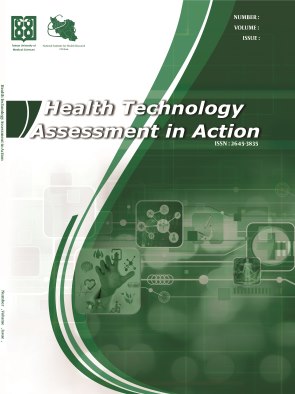Developing an Accreditation Model for Disaster Management in Iran’s Primary Health Care System
Abstract
Context: Disaster management is one of Iran’s primary health care (PHC) areas, and it is becoming increasingly important due to continuous disasters.
Objectives: This study aimed to develop a national accreditation model for disaster management in Iran’s PHC system.
Methods: The primary model was developed by reviewing the literature/documents and organizing specialized interviews with the experts. Then, the Delphi technique was used to reach a consensus among experts on the developed model. The primary standards were assessed from the experts' perspective based on "importance" and "feasibility" criteria on a 9-degree scale. In two rounds of Delphi, 14 out of 16 experts completed the questionnaires.
Results: The final developed model emphasizes providing required resources, enhancing the preparedness of health centers and households, taking appropriate actions in three phases of disaster, and evaluating the disaster management program.
Conclusions: Considering the strong consensus among experts on the Delphi stage, this model can improve disaster management performance.
2. Sariego J. CCATT: A Military Model for Civilian Disaster Management. Disaster Manag Response. 2006;4(4):114-7.
3. Jennings-Sanders A. Teaching disaster nursing by utilizing the Jennings disaster nursing management model. Nurse Educ Pract. 2004;4(1):69-76.
4. Baker D, Refsgaard K. Institutional development and scale matching in disaster response management. Ecological Economics. 2007;63(2):337-43.
5. Mahdi T, Mahdi A. Reconstruction and retrofitting of buildings after recent earthquakes in Iran. Procedia Engineering. 2013;54(3):127-39.
6. Malaki MR, Shojaie P. Hospitals preparation in disasters: security. J Health Administration. 2007;10(28):65-71.
7. Hosseini Shokouh SM, Anjomshoa M, Mousavi SM, Sadeghifar J, Armoun B, Rezapour A. Prerequisites of preparedness against earthquake in hospital system: a survey from Iran. Glob J Health Sci. 2014;6(2):237-45.
8. Al Khalaileh MA, Bond E, Alasad JA. Jordanian nurses’ perceptions of their preparedness for disaster management. Int Emerg Nurs. 2011;20(1):14-23.
9. Olness K, Sinha M, Herran M, Cheren M, Pairojkul S. Training of health care professionals on the special needs of children in the management of disasters: experience in Asia, Africa, and Latin America. Ambul Pediatr. 2005;5(4):244-8.
10. Pujawan IN, Kurniati N, Wessiani NA. Supply chain management for disaster relief operations: principles and case studies. Int J Log Syst Manag. 2009;5(6):1-15.
11. Bulut M, Fedakar R, Akkose S, Akgoz S, Ozguc H, Tokyay R. Medical experience of a university hospital in Turkey after the 1999 Marmara earthquake. Emerg Med J. 2005;22(7):494-8.
12. Gupta SH, Kant S. Emergency medical services and disaster management. ed n, editor. New Delhi: Gaypee Inc; 2004.
13. World Health Organization. Risk reduction and emergency preparedness, WHO six-year strategy for the health sector and community capacity development. Geneva, Switzerland: World Health Organization Publisher; 2007.
14. Hatami H, Neisi A, Kooti M. Functional, structural and non-Structural preparedness of Ahvaz health centers against disasters in 2014-2015. Jundishapur J Health Sci. 2017;9(1):1-6.
15. Tabrizi JS, Gharibi F, Pirahary S. Developing of national accreditation model for rural health centers in Iran health system. Iran J Public Health. 2013;42(12):1438-45.
16. Tabrizi JS, Gharibi F. Systematic survey of accreditation models for designing a national model. Sci J Kurdistan Uni Med Sci. 2011;16(3):95-109.
17. Al-Awa B, De Wever A, Melot C, Devreux I. An overview of patient safety and accreditation: a literature review study. RJMS. 2011;5:200-23.
18. Fortune T, O’ Connor E, Donaldson B. Guidance on designing healthcare external evaluation programmes including accreditation. Dublin, Ireland: International Society for Quality in Healthcare (ISQua); 2015.
19. Greenfield D, Civil M, Donnison A, Hogden A, Hinchcliff R, Westbrook J, et al. A mechanism for revising accreditation standards: a study of the process, resources required and evaluation outcomes. BMC Health Serv Res. 2014;14(571):1-6.
20. Braithwaite J, Westbrook J, Pawsey M, Greenfield D, Naylor J, Iedema R, et al. A prospective, multi-method, multi-disciplinary, multi-level, collaborative, social-organisational design for researching health sector accreditation. BMC Health Serv Res. 2006;6(13):1-10.
21. Smits PA, Champagne F, Contandriopoulos D, Sicotte C, Préval J. Conceptualizing performance in accreditation. Int J Qual Heal Care. 2008;20(1):47-52.
22. Ammar W, Wakim IR, Hajj I. Accreditation of hospitals in Lebanon: a challenging experience. East Mediterr Health J. 2007;13(1):138-49.
23. El-Jardali F. Hospital accreditation policy in Lebanon: its potential for quality improvement. J Med Liban. 2007;55(1):39-45.
24. Saleh SS, Sleiman JB, Dagher D, Sbeit H, Natafgi N. Accreditation of hospitals in Lebanon: is it a worthy investment? Int J Qual Heal Care. 2013;25(3):284-90.
25. Kim YS, Han SH, Hwang JH, Park JM, Lee J, Choi J, et al. Development of the Korean framework for senior-friendly hospitals: a Delphi study. BMC Health Serv Res. 2017;17(528):1-11.
26. Lawshe CH. A quantitative approach to content validity. Pers Psychol. 1975;28:563-75.
27. Lee PP, Sultan MB, Grunden JW, Cioffi GA. Assessing the Importance of IOP Variables in Glaucoma Using a Modified Delphi Process. Glaucoma J. 2010;19(5):281-7.
28. Culley JM. Use of a computer-mediated delphi process to validate a mass casualty conceptual model. CIN: Computers, Informatics, Nursing. 2011;29(5):272-9.
29. Rowe G, Wright G, Bolger F. Delphi: a reevaluation of research and theory. Technol Forecast Soc Change. 1991;39:235-51.
30. Tabrizi JS, Gharibi F, Dadgar E. Developing a departmental accreditation model for primary healthcare in Iran. Middle East J Rehabil Health Stud. 2021;8(2):e110127.
31. Lestari F, Paramitasari D, Kadir A, Firdausi NA, Yani Hamid A, EL-Matury HJ, Wijaya O, Ismiyati A. The application of hospital safety index for analyzing primary healthcare center (PHC) disaster and emergency preparedness. Sustainability. 2022;14(1488):1-19.
32. Abbasabadi Arab M, Khankeh HR, Mosadeghrad AM, Farrokhi M. Developing a hospital disaster risk management evaluation model. Risk Mng Healthcare Policy. 2019:12(1):287-296.
33. Tabrizi JS, Gharibi F. Situation of disaster management in accreditation national model of hospital performance. Quart Sci J Rel Resc. 2012;4(3):35-46
| Files | ||
| Issue | Articles in Press | |
| Section | Articles | |
| Keywords | ||
| accreditation disaster management model | ||
| Rights and permissions | |

|
This work is licensed under a Creative Commons Attribution-NonCommercial 4.0 International License. |




